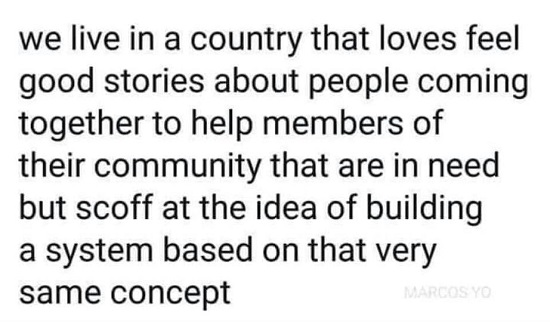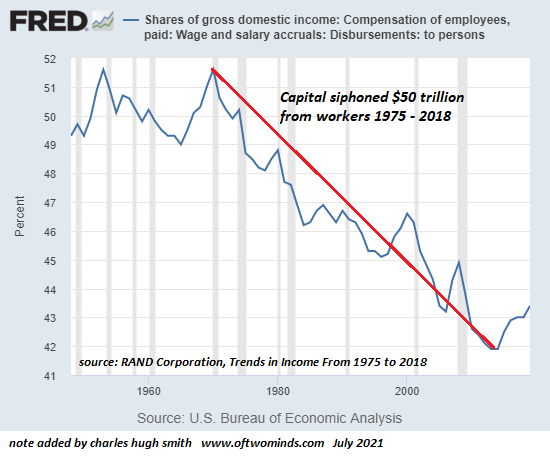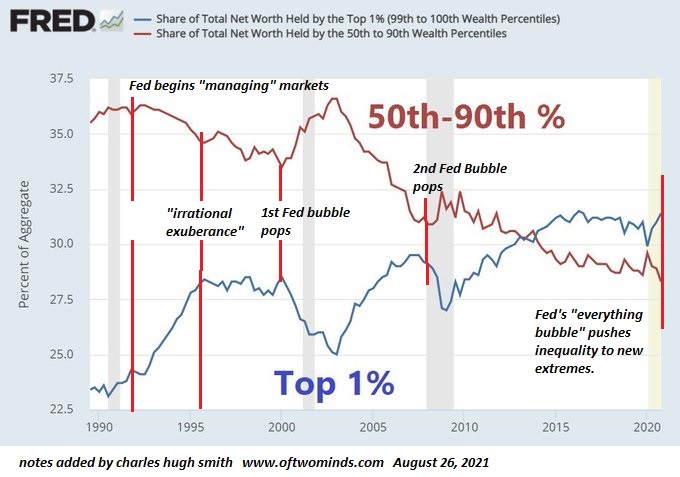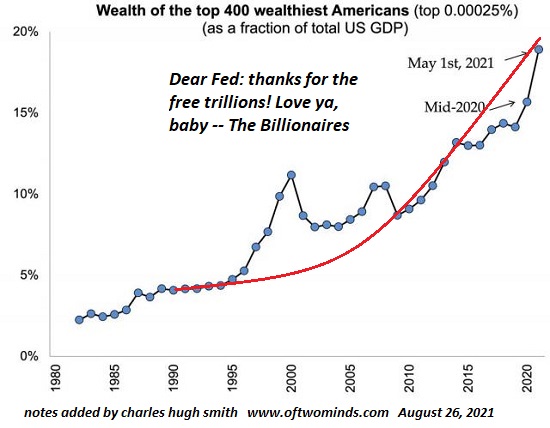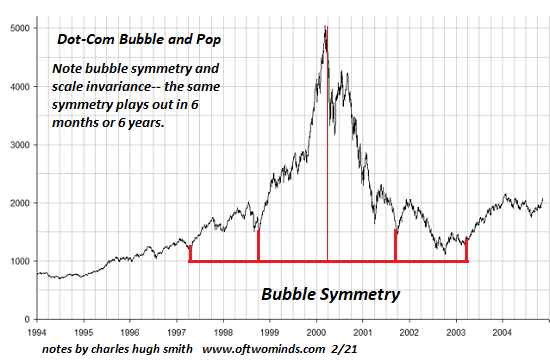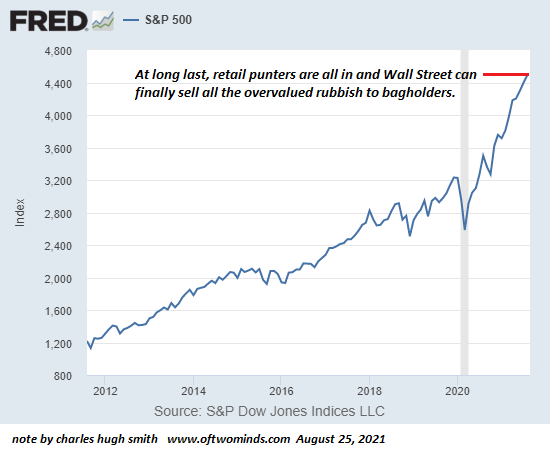The Elites' Battle for the Future America
No nation can produce less of lesser quality, and squander more on infinitely greedy and corrupt elites,
all funded by issuing trillions of new units of currency, and imagine
that this asymmetry will never have consequences.
As I have often noted, historian Michael Grant identified profound political
disunity in the ruling class as a key cause of the dissolution of the Roman Empire.
Grant described this dynamic in his excellent account
The Fall of the Roman Empire, a book I have been recommending since 2009.
I've been writing about the fractures in America's ruling elites for many years, as well as the erosion
of the foundations of society that lead to systemic collapse, for example,
Collapse, Part 2: The Nine Dynamics of Decay (June 2015),
Going to War with the Political Elite You Have (May 14, 2007)
and
The Conflict within the Deep State Just Broke into Open Warfare (March 10, 2017)
America's elites are fracturing along multiple tectonic fissures: while the conventional media focuses
on the ginned-up bread and circuses of Red and Blue political games (i.e., The Purple Empire),
the real conflicts are within the camps running the Red and Blue games, the Imperial Project of global hegemony
(a.k.a. The Deep State), the New Nobility of Big Tech attempting to overthrow the Old Nobility,
the Nationalists versus the Globalists and the Financial Gamesters versus The New Foundation.
These are my informal acronyms, of course, but the conflicts are real and intensifying as extreme policies reach
new extremes and the risks of breakdown increase.
The most dangerous elites are the ones clinging to the perverse but compelling faith that the Federal
Reserve and Treasury can conjure endless trillions of U.S. dollars without any consequence other than
continued global hegemony, the faith that the Federal Reserve has god-like powers to tweak the dials
so that 1) the U.S. dollar remains the pre-eminent reserve currency 2) but not so strong that it sinks the
emerging market economies and 3) magical enough that there are no limits on how many can be absorbed by
global stock, bond, debt, risk and commodity markets and 4) remains the primary method of limiting the
global financial leverage of geopolitical rivals. Uh, sure. No problem, the Fed is all-powerful, right?
The fundamental problem for the Imperial Project is the dollar must serve both the domestic elites
profiting from Federal Reserve expansion of asset bubbles and the global markets that rely on a stable
dollar for reserves, credit and transactional liquidity. While America's billionaires are cheering
the Fed's endless largesse to the already wealthy, those tasked with maintaining hegemony are looking ahead
and seeing the debauchery of the U.S. dollar as the Fed and Treasury spew trillions, very little of which
is actually flowing into productive investments, i.e. the ultimate foundation of hegemony.
It's instructive to observe the institutional symmetries between the Federal Reserve and its
elite backers and the Soviet agencies which oversaw Chernobyl, a history illuminated in
Chernobyl: The History of a Nuclear Catastrophe.
It seems the only agency with a comprehensive grasp of the Soviet nuclear power industry was the KGB, which
had sources within every nook and cranny of the state, economy and society. State secrets were protected
to the point that even political elites did not have access to the potential for failure and the consequences
of failure.
Just as in the final throes of Imperial collapse in the Soviet Union, nobody seems to be in charge in the
U.S. It's difficult to tell if incompetence is now the default setting everywhere in the American State
or if there are a couple of competing chess games being played behind the curtain. When failure is so
absolute, incompetence alone doesn't seem quite up to the task. Perhaps failure received a nudge. After all,
the cliff edge is already crumbling and it doesn't take much to help a rival lose their footing.
As I have argued recently, inflation is not transitory; the trends have reversed and inflation is now
embedded via two fundamental dynamics: the endless trillions being created out of thin air by the Fed and
Treasury are not increasing the productivity or resilience of the U.S. economy; rather they are fatally weakening
the economy and society by institutionalizing soaring wealth-income-power inequality, and 2) globalization's
increase of global supplies and optimization of global supply chains has reversed; scarcities can no longer
be filled by exploiting another developing-economy via neocolonial-neoliberal pillage. That oh-so-profitable
game is over, but few believe it's possible: isn't there always another place and people to pillage?
The warring elites will have to choose an economic side soon: either go with the Fed's plan for an
ever-more unequal future America in which inflation stripmines the bottom 90% while the technocrat class and its
billionaire owners become ever-wealthier and the world loses confidence in the predictability of
the U.S. dollar's value, or the debt and phantom capital of the Fed's sand castles are wiped away
and the dollar is re-anchored to the nation's economic foundations of improving productivity via
newly enforced competition, transparency and accountability and the resilience of a reshored industrial base.
Hopefully America's equivalents of the KGB have an equivalently sound grasp of just how prone to failure
America's financial fantasy has become. No empire can survive the debauchery of its currency, for the
empire's power flows not from hard power (military) or soft power (cultural influence) but from the currency
that funds both hard and soft power.
There is no win-win at this late date: one elite will lose, and America will itself be lost if those
debauching the dollar are allowed to win. The rationalizations are as absurd and extreme as the policies:
as long as the trillions flow into the assets owned by billionaires, there can't be any inflation, and so on,
an endless spew of excuses by those profiting from the debauchery of the dollar.
No nation can produce less of lesser quality, and squander more on infinitely greedy and corrupt elites,
all funded by issuing trillions of new units of currency, and imagine
that this asymmetry will never have consequences.
It's not yet clear that there is any leadership left in America. What's playing on stage are
warring camps of self-interested elites fighting to secure their power even as the foundations crumble beneath
their feet.
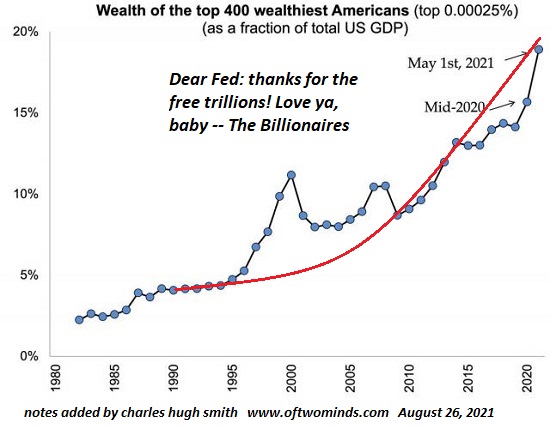

If you found value in this content, please join me in seeking solutions by
becoming
a $1/month patron of my work via patreon.com.
My new book is available!
A Hacker's Teleology: Sharing the Wealth of Our Shrinking Planet
20% and 15% discounts (Kindle $7, print $17,
audiobook now available $17.46)
Read excerpts of the book for free (PDF).
The Story Behind the Book and the Introduction.
Recent Videos/Podcasts:
Charles Hugh Smith on Secular Inflation (Host Richard Bonugli, 31 min)
My COVID-19 Pandemic Posts
My recent books:
A Hacker's Teleology: Sharing the Wealth of Our Shrinking Planet
(Kindle $8.95, print $20,
audiobook $17.46)
Read the first section for free (PDF).
Will You Be Richer or Poorer?: Profit, Power, and AI in a Traumatized World
(Kindle $5, print $10, audiobook)
Read the first section for free (PDF).
Pathfinding our Destiny: Preventing the Final Fall of Our Democratic Republic
($5 (Kindle), $10 (print), (
audiobook):
Read the first section for free (PDF).
The Adventures of the Consulting Philosopher: The Disappearance of Drake
$1.29 (Kindle), $8.95 (print);
read the first chapters
for free (PDF)
Money and Work Unchained $6.95 (Kindle), $15 (print)
Read the first section for free (PDF).
Become
a $1/month patron of my work via patreon.com.
NOTE: Contributions/subscriptions are acknowledged in the order received. Your name and email remain confidential and will not be given to any other individual, company or agency.
|
Thank you, Gerald B. ($50), for your exceptionally generous contribution to this site -- I am greatly honored by your steadfast support and readership. |
Thank you, A.M.H. ($5/month), for your superbly generous pledge to this site -- I am greatly honored by your support and readership. |
|
|
Thank you, Bowen S. ($60), for your magnificently generous contribution to this site -- I am greatly honored by your support and readership. |
Thank you, Guy T. ($50), for your splendidly generous contribution to this site -- I am greatly honored by your steadfast support and readership. |



















